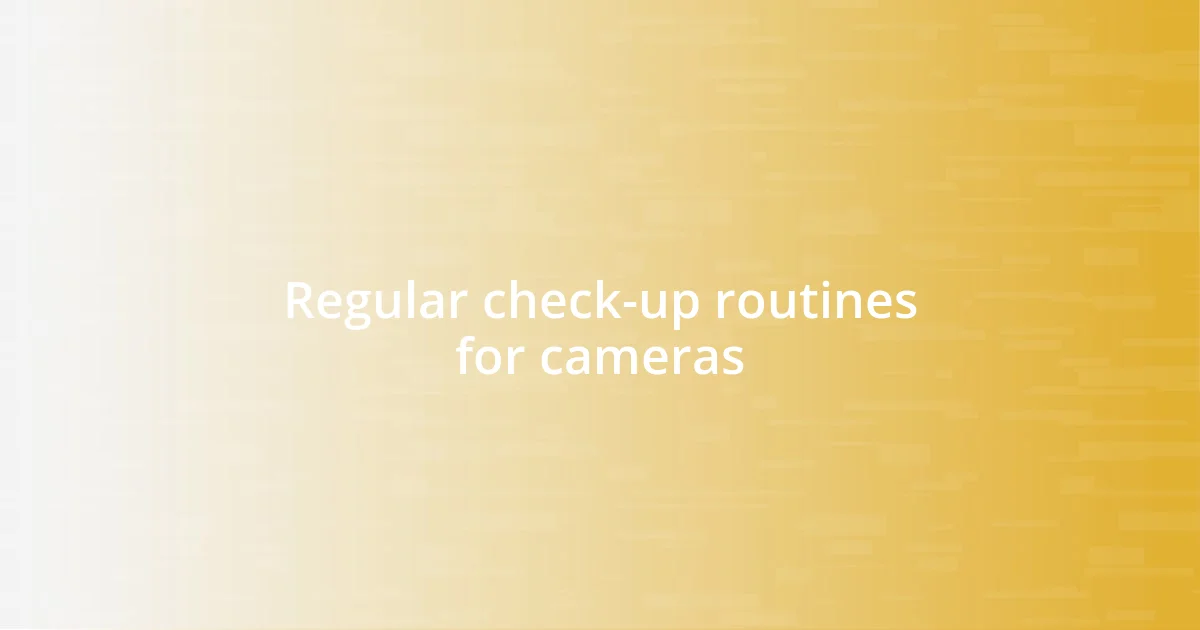Key takeaways:
- Regular camera maintenance is essential for optimal performance, prolonging gear life, and enhancing the photography experience.
- Investing in essential cleaning tools and protective cases can prevent damage and improve image quality.
- Establishing a routine for regular check-ups and careful storage ensures your camera remains in excellent condition and ready for use.

Understanding camera maintenance importance
Think about the last time you pulled out your camera and it just wouldn’t cooperate. Frustrating, right? I remember a family vacation where my camera decided to malfunction right as we were about to capture the sunset. That moment made me realize how critical maintenance is – it’s the difference between capturing lifelong memories and facing disappointment.
Regular camera maintenance not only protects your gear but also enhances your overall photography experience. I once took my camera for a simple cleaning, and it felt like I was reunited with an old friend – the clarity and sharpness of my images improved dramatically! Maintaining your camera can prolong its life, which means more adventures and more memories captured.
Have you ever considered how much money you invest in your camera gear? I certainly have, and it hit me hard when I realized that neglecting maintenance could lead to costly repairs or replacements. A well-maintained camera not only performs better, but it also serves as a reminder that taking care of our tools is just as important as the art we create with them.

Essential tools for camera care
When it comes to camera maintenance, having the right tools on hand can make all the difference. I remember the first time I had to deal with dust on my lens; it was a frustrating experience. I learned the hard way that investing in some essential tools can save you not just time but also the heartache of missing precious shots because of an unclean camera.
Here’s a handy list of essential tools for camera care:
- Lens Cleaning Solution: Gently cleans lenses without damaging coatings.
- Microfiber Cloth: Ideal for wiping down lenses without leaving scratches.
- Rocket Blower: Safely removes dust without contact.
- Sensor Swabs: Perfect for cleaning the camera sensor when dust accumulates.
- Tripod: Not just for stability, but it helps in proper maintenance by allowing careful adjustments.
- Protective Filters: Shield your lens from scratches and dirt.
- Camera Bag: Keeps your gear organized and protected while traveling.
Every time I use these tools, I feel more in control of my gear. It’s a comforting routine that reminds me how much I love my photography journey.

Cleaning your camera lens properly
Cleaning your camera lens properly is essential for maintaining the quality of your images. I can’t stress enough how a simple act of cleaning can transform your photos. The first time I carefully cleaned my lens, the clarity was astonishing. I had been capturing some dreamy landscapes, but the images felt dull. After a thorough clean, the colors popped, and I felt like I was seeing the world in high definition.
When cleaning your lens, approach it with gentle precision. Use a microfiber cloth and a lens cleaning solution designed for optics. I’ve made the mistake of using rough fabrics before, and believe me, it left micro-scratches that I still see in certain lighting. A little care goes a long way. I always start with the rocket blower to remove loose dust before tackling smudges with my cloth. It’s a small step, but it makes a huge difference, especially during important shoots.
I’ve learned to keep a strict cleaning routine: before and after every major outing. This habit not only protects my gear but also instills confidence as I’m out capturing the world. There’s something reassuring about knowing that my camera is in top shape, ready to seize those fleeting moments. Here’s a quick comparison of the common methods I use for lens cleaning:
| Method | Details |
|---|---|
| Rocket Blower | Great for removing loose dust without contact. |
| Microfiber Cloth | Soft, non-abrasive, perfect for smudges and fingerprints. |
| Lens Cleaning Solution | Safe for coatings, ensures thorough cleaning without damage. |
| Lens Brush | Helpful for stubborn dirt but use with care to avoid scratching. |

Protecting your camera body
Protecting your camera body is all about creating a barrier between your equipment and the rigors of the outside world. I still remember that day at the beach when a wave unexpectedly crashed, splashing saltwater right onto my beloved camera. My heart dropped as I scrambled to dry it off. From that moment on, I made it my mission to use protective cases and wraps. Investing in a good quality camera bag with weatherproof features has since become a no-brainer for me.
On top of that, I’ve found that using a screen protector can save your LCD from scratches and smudges. I recall one outdoor shoot where I set my camera down on a rough surface, completely forgetting about the potential damage. It was a wake-up call! Now, I always use a protector to minimize the risks. It’s a small investment but can make a world of difference in preserving the longevity of your gear.
Additionally, consider using a lens cap when you’re not shooting. It may seem like a hassle to keep putting it on and taking it off, but I can’t emphasize enough how many times I’ve avoided scratches and dirt thanks to this simple practice. Protecting your camera body isn’t just about avoiding damage; it’s about nurturing your passion for photography and ensuring that your gear continues to serve you well for years to come.

Maintaining camera battery life
Maintaining camera battery life is a crucial part of ensuring you’re always ready to snap that perfect shot. One tip that really transformed my photography outings was investing in a spare battery. I remember feeling that familiar rush of dread when I realized my battery was running low during a beautiful sunset shoot. I had to race against the clock, and it was a stressful experience. Now, I always keep an extra charged battery in my bag just in case, and it’s made a world of difference in my ability to capture fleeting moments without worry.
I’ve also learned a few practices that help extend the life of my camera’s battery. For instance, I make a conscious effort to turn off image stabilization and Wi-Fi when I’m not using them. The first time I did this, I was amazed at how much longer my battery lasted throughout a day of shooting. Have you ever experienced the frustration of finding your battery drained during an important session? By keeping those functions off when unnecessary, I not only save power but also keep my camera in top shape for longer.
Finally, I recommend paying attention to temperature fluctuations. I once took my camera out in the cold, and it turned out my battery life plummeted dramatically. Now, I ensure to keep my camera cozy in a bag close to my body when not in use during chilly outings. This simple habit helps maintain battery performance, and I can focus on composing my shots instead of worrying about battery life. What about you? Have you found any tricks that work for you?

Storing your camera safely
When it comes to storing your camera safely, I’ve discovered that keeping it in a controlled environment can make all the difference. I learned this lesson the hard way after accidentally leaving my camera in a humid garage during a summer trip. When I finally retrieved it, I found condensation had formed inside. Now, I diligently store my gear in a dry, cool place, preferably in a dedicated camera bag that protects it from temperature fluctuations.
I’ve also found that utilizing silica gel packs in my camera bag is a smart move. They help absorb excess moisture and provide peace of mind, especially when I’m shooting in unpredictable weather. I vividly remember a hike where I had to make the choice to leave my camera behind or risk taking it out in the rain. Having those silica packs ready meant I could venture out without fear of damage, and it felt great to know my gear was safe afterward.
Finally, always make sure to store your camera with the lens detached. This practice not only protects the sensor from dust but also reduces pressure on the lens mount. Once, I rushed to store my camera after a long day of shooting and accidentally knocked the lens against something hard. It was a heart-sinking moment that taught me the value of careful storage. So, how do you protect your gear? Sharing methods helps us all learn and grow in our photography journey!

Regular check-up routines for cameras
When it comes to regular check-up routines for cameras, I can’t stress enough the importance of a thorough inspection every few months. I personally set reminders in my calendar to clean my camera, not just the lens but also the body. There was a moment during a wildlife shoot when I noticed a speck of dust on my sensor. I had to fix it in the field, and let me tell you, it was nerve-wracking! Now, I use sensor cleaning tools and lens wipes as part of my routine, allowing me to enjoy my shoots without the anxiety of unwanted spots in my images.
I also find it helpful to check all the settings on my camera, ensuring everything is functioning as it should. During one memorable trip, I discovered that my autofocus had somehow been switched off, leading to a series of blurry photos that I still think about. Regular check-ups have taught me that preventive maintenance can save you from that sinking feeling of missed opportunities. How often do you check your settings before heading out?
Lastly, I make it a habit to examine the connection ports and the battery compartment, ensuring they’re clean and free of debris. There was an embarrassing incident where my camera wouldn’t turn on because a tiny piece of lint was blocking the battery connection. I learned to be proactive and include this in my routine. Addressing these little details not only keeps my camera in excellent working condition but also provides me with peace of mind, knowing it’s always ready for the next adventure. How do you maintain your gear between shoots? Let’s share what works!















